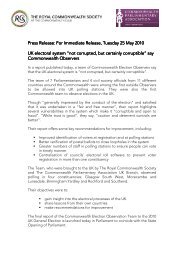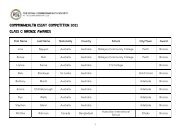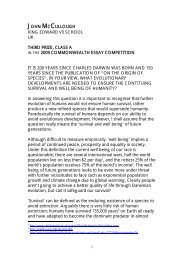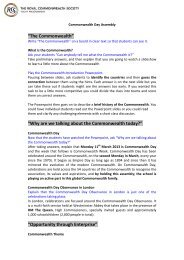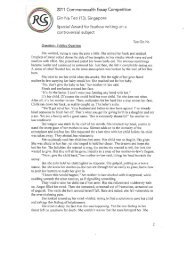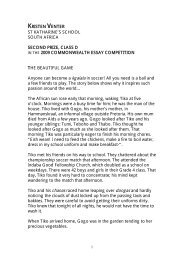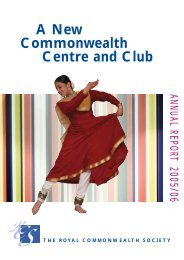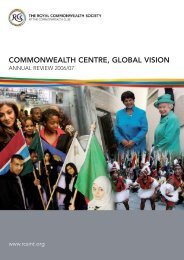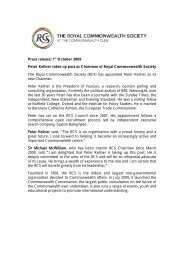Annual Review 2007-2008 - The Royal Commonwealth Society
Annual Review 2007-2008 - The Royal Commonwealth Society
Annual Review 2007-2008 - The Royal Commonwealth Society
You also want an ePaper? Increase the reach of your titles
YUMPU automatically turns print PDFs into web optimized ePapers that Google loves.
It is not only the volume, but also the<br />
diversity of migration that is significant.<br />
We have more different kinds of people<br />
rubbing shoulders than ever before. We<br />
know from our experience in the<br />
<strong>Commonwealth</strong> that you can't simply<br />
pretend that the world is divided into<br />
crude categories devised by the<br />
eighteenth century taxonomist Carl<br />
Linnaeus: black, white, red, brown and<br />
yellow. Even the 17 ethnic categories<br />
used in the 2001 Census now look pretty<br />
crude, when we consider that a single<br />
category – African – covers Birminghamborn<br />
sons of Somali herdsmen and<br />
Ghanaian barristers; another, Polish<br />
electricians and South African doctors.<br />
That means that our historic policy of<br />
simply leaving well alone and hoping that<br />
people will somehow muddle their way to<br />
an integrated society won't do any more.<br />
It was never going to happen by accident<br />
anyway; but this new, modern kind of<br />
migration demands more proactive<br />
measures than we've ever used before.<br />
<strong>The</strong> laissez-faire multiculturalism of the<br />
past simply will not serve in this new era.<br />
Let me emphasize that I am not lining<br />
up with those who say that we cannot<br />
cope with this new migration; quite the<br />
opposite. Groups like Migration Watch<br />
offer bad arithmetic and a counsel of<br />
despair. I believe that our historical<br />
inheritance as part of the <strong>Commonwealth</strong><br />
equips us better than any other group of<br />
people anywhere in the world to manage<br />
the inevitable pressures of the new,<br />
hyper-diverse world. But we won't do it<br />
unless we are active on exploiting the<br />
lessons of that heritage, including the<br />
lessons of what we failed to do.<br />
First, we can recognise that a diverse<br />
society is an inescapable consequence of<br />
Trevor Phillips, OBE<br />
delivering a keynote<br />
address, ‘People on the<br />
move: more different,<br />
more unequal?’ as part of<br />
the RCS series on<br />
Migration<br />
human freedom, but such a society will<br />
never be at peace with itself if difference<br />
becomes an explanation for inequality.<br />
Inequality traps us into a box marked<br />
black or white, woman or man, disabled<br />
or able-bodied and consigns us to live<br />
out the destiny that the box contains. But,<br />
in this age of difference, one of the<br />
principal aims of a progressive society<br />
must surely be to liberate each and every<br />
one of us from that box, both in others'<br />
eyes and in reality.<br />
Let me emphasise that this does not<br />
mean that our identities aren't important<br />
to us. But, just as we don't want to force<br />
ourselves to be the same, so we do not<br />
want our destiny to be defined by those<br />
bits of our identity that other people<br />
decide are important. Yet, as the myriad<br />
versions of humanity become more<br />
manifest, the difficulties of dealing with<br />
our differences become more pressing.<br />
One part of our mission at the EHRC is<br />
to ensure that no-one is left behind. But<br />
we want to be about more than<br />
straightforward anti-discrimination policy,<br />
as important as that is. We need, for<br />
example, to ensure that, not only are<br />
people not shut out of jobs by bigotry,<br />
but that they can compete for the jobs<br />
that are available. That is why we take an<br />
intense interest in the skills agenda.<br />
In this world of rapid change we have<br />
to ensure that people are equipped with<br />
the human capital which can give them an<br />
equitable stake in the global market<br />
place. Domestically, that cannot mean<br />
shutting out skilled migrants; it means<br />
making them unnecessary by ensuring<br />
that all young people have the capacity<br />
to compete.<br />
<strong>The</strong> Prime Minister has been much<br />
criticised for using the phrase "British jobs<br />
for British workers" because the phrase<br />
was once used by the more thuggish end<br />
of the far right. I think that this is both<br />
unfair and unfortunate. I think I know<br />
enough about Gordon Brown to be sure<br />
that he would be horrified to think that his<br />
words are being taken to imply some kind<br />
of racial exclusivity. In fact, I would say his<br />
concern has been above all for those<br />
ethnic minority young people currently<br />
shut out of the jobs market. In all his uses<br />
of the phrase it was clear that what he has<br />
been trying to raise is exactly the same<br />
point I am raising here - that to compete<br />
in the modern world, all our young people<br />
need to have the skills to compete. If we<br />
try to shut out foreigners without<br />
providing the skills amongst British<br />
workers, all that will happen is that the<br />
jobs will go elsewhere. In a sense, what we<br />
really want to make sure we have are<br />
British workers for British jobs.<br />
Second, we can recognise the<br />
importance of our common heritage. <strong>The</strong><br />
way we talk to each other in a diverse<br />
society is of the utmost importance.<br />
English is the single most important<br />
language in the world, partly driven by<br />
the commercial imperatives which our<br />
American cousins are so good at, but in<br />
reality made powerful by our British<br />
cultural heritage. That is why I welcome<br />
the strong support to English learning<br />
that the government is now providing,<br />
and in particular the government's<br />
proposal for free classes for those who<br />
want to make this country their new<br />
home.<br />
And in the so-called war against terror,<br />
the Prime Minister must surely be right<br />
when he says that our ultimate weapon is<br />
not security or military action. It lies in the<br />
attractiveness of our culture, our ideas<br />
and our way of life, expressed through<br />
our creative output, both refined and<br />
popular. In this, I believe there is a role for<br />
the <strong>Commonwealth</strong> to play: to inspire<br />
people to be the best, most humane and<br />
most moral that they can be.<br />
If our <strong>Commonwealth</strong> is to have<br />
meaning in the twenty-first century surely<br />
it has to be by taking the lead on issues<br />
of this kind.<br />
This is an edited version of a speech by<br />
Trevor Phillips OBE to the <strong>Royal</strong><br />
<strong>Commonwealth</strong> <strong>Society</strong> on 15 January<br />
<strong>2008</strong>.<br />
Trevor Phillips OBE is the Chair of the<br />
Equality and Human Rights Commission,<br />
an organisation promoting equality issues<br />
across ethnic, gender, sexual orientation,<br />
disability and other minority interests.<br />
www.rcsint.org<br />
39



